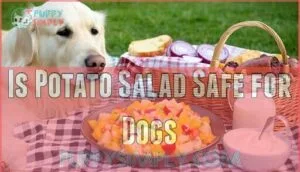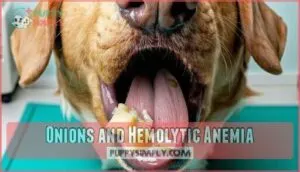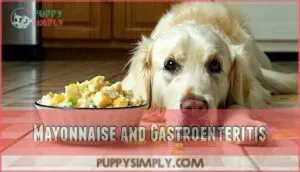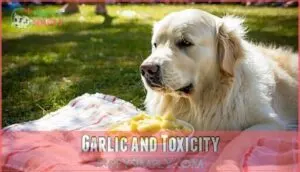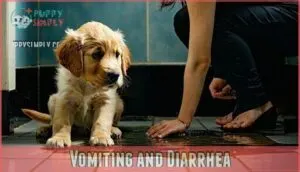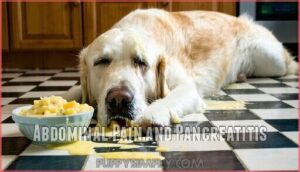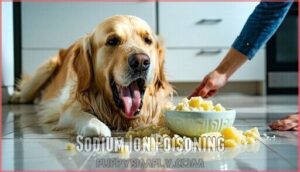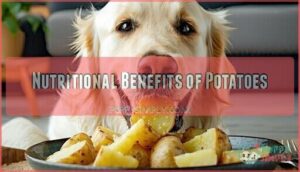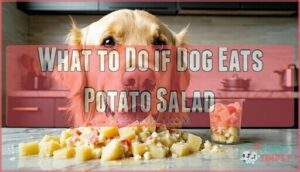This site is supported by our readers. We may earn a commission, at no cost to you, if you purchase through links.
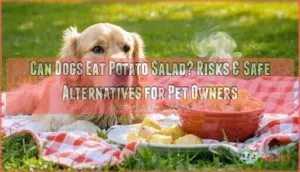
While plain potatoes aren’t toxic, potato salad contains dangerous ingredients like onions, garlic, and mayonnaise that can make your pup seriously sick.
Onions and garlic can cause anemia, while the high-fat mayo can trigger painful pancreatitis.
Even seemingly harmless seasonings like salt can be problematic in large amounts.
If your dog snatches a bite at your barbecue, don’t panic—but keep a close eye on them for symptoms like vomiting or lethargy.
Plain boiled potatoes make a much safer treat for your four-legged friend.
Table Of Contents
- Key Takeaways
- Can Dogs Eat Potato Salad
- Is Potato Salad Safe for Dogs
- Risks of Feeding Potato Salad
- Symptoms of Potato Salad Consumption
- Safe Potato Preparations for Dogs
- How to Serve Potatoes to Dogs
- Nutritional Benefits of Potatoes
- What to Do if Dog Eats Potato Salad
- Frequently Asked Questions (FAQs)
- Is potato salad ok for dogs to eat?
- Will a little mayonnaise hurt a dog?
- Can dogs eat cold potatoes?
- Can puppies eat small amounts of potato salad?
- How long after eating should symptoms appear?
- Are homemade potato salads safer than store-bought?
- What specific potato salad ingredients cause toxicity?
- Should I induce vomiting after potato salad consumption?
- Conclusion
Key Takeaways
- Don’t feed your dog potato salad – it contains toxic ingredients like onions and garlic that can cause serious health problems, including anemia and digestive upset
- Watch for symptoms if your dog ate some – vomiting, diarrhea, lethargy, and abdominal pain can appear within hours of consumption
- Plain boiled potatoes are safe alternatives – skip all seasonings, butter, and additives when preparing potatoes as occasional treats for your dog
- Contact your vet immediately – if your dog shows any concerning symptoms after eating potato salad, especially persistent vomiting or difficulty breathing
Can Dogs Eat Potato Salad
You shouldn’t feed your dog potato salad because it contains ingredients that can harm them.
The onions, garlic, and high-fat mayonnaise in potato salad can cause serious health problems ranging from stomach upset to toxic reactions, including serious health issues.
Health Risks of Potato Salad
Potato salad poses serious health risks for your furry friend.
This seemingly innocent side dish contains multiple toxic potato salad ingredients that can trigger gastrointestinal distress, pancreatitis risk, and even life-threatening conditions.
Onion toxicity tops the danger list, while mayonnaise dangers include digestive upset.
Salt poisoning and dairy issues add extra concerns, making potato salad bad dogs should never consume.
Lettuce, however, offers nutritional benefits for dogs and is a safer alternative, providing a better choice to avoid potato salad ingredients and onion toxicity for the health of your dog, thus reducing the risk of salt poisoning.
Harmful Ingredients in Potato Salad
Several toxic potato salad ingredients dogs shouldn’t consume include onions and garlic, which cause onion toxicity and severe health complications.
Mayonnaise risks include digestive upset and pancreatitis from high fat content.
Salt poisoning occurs from excessive sodium, while dairy ingredients like sour cream trigger dairy intolerance.
These toxic foods for dogs make potato salad dangerous for your pet’s health.
Is Potato Salad Safe for Dogs
Unfortunately, potato salad isn’t safe for dogs.
This popular picnic dish contains several potato salad ingredients that pose serious health risks to your furry friend.
Onion toxicity represents the biggest concern, as even small amounts can damage your dog’s red blood cells over time.
Mayonnaise risks include gastrointestinal upset and potential pancreatitis due to high fat content.
Most potato salad recipes also include garlic, salt, and other toxic foods for dogs that can cause sodium poisoning or digestive issues.
While plain potatoes are generally safe, the combination of harmful ingredients makes potato salad dangerous for dog health.
Following proper serving guidelines means avoiding this dish entirely.
If you’re concerned about your pet’s diet or dog food safety, vet consultation is always recommended.
Your dog’s well-being depends on keeping human foods like potato salad off their menu, and being aware of onion toxicity and the risks of gastrointestinal upset is crucial for their safety.
Risks of Feeding Potato Salad
Potato salad poses several serious health risks for your dog due to its harmful ingredients.
The combination of onions, mayonnaise, and garlic can lead to dangerous complications ranging from digestive upset to life-threatening blood disorders.
Onions and Hemolytic Anemia
Onions pack a dangerous punch for your dog’s health. These seemingly harmless vegetables contain compounds that destroy red blood cells, leading to hemolytic anemia. Even small amounts can trigger serious blood disorders requiring emergency veterinary care.
Even tiny amounts of onions can destroy your dog’s red blood cells, causing life-threatening anemia.
- Onion toxicity occurs at just 0.5% of your dog’s body weight
- Anemia symptoms include pale gums, weakness, and dark urine
- Hemoglobin levels drop dramatically within days of exposure
- Blood transfusions may be necessary in severe poisoning cases
A dog’s toxic onion dose can be calculated based on its weight.
Mayonnaise and Gastroenteritis
High-fat content in mayonnaise poses significant Mayonnaise Risks for your dog’s digestive system.
This creamy condiment contains 70-80% fat, triggering digestive upset and potentially serious pancreatitis risk.
Even small amounts can cause dog vomiting and diarrhea in dogs, making pet gastrointestinal issues a real concern when pancreatitis develops.
Given that mayonnaise is largely fat, it’s important to bear in mind <strong>mayonnaise's high fat content</strong> and its potential impact.
| Symptom | Onset Time | Severity |
|---|---|---|
| Vomiting | 2-6 hours | Mild to severe |
| Diarrhea | 4-12 hours | Watery, frequent |
| Lethargy | 6-24 hours | Moderate |
| Abdominal pain | 8-24 hours | Severe |
| Dehydration | 12-48 hours | Critical |
Garlic and Toxicity
Even small amounts of garlic can spell trouble for your furry friend.
Garlic contains thiosulfates that damage red blood cells, leading to hemolytic anemia.
Unlike onion toxicity in dogs, garlic toxicity levels are lower—just 2 grams per pound causes gastrointestinal upset.
Garlic poisoning symptoms include vomiting, weakness, and pale gums.
Pet poisoning from dog ingestion of human food happens fast, so garlic exposure risks aren’t worth taking.
Dogs are especially vulnerable because they can’t metabolize thiosulfates.
Symptoms of Potato Salad Consumption
If your dog ate potato salad, watch for signs that something’s wrong with their digestive system.
Common symptoms include vomiting, diarrhea, and stomach pain that can appear within hours of eating the harmful ingredients.
Vomiting and Diarrhea
When your dog eats potato salad, digestive upset often strikes first.
Vomiting and diarrhea are common reactions that can leave your pet feeling miserable and lead to dehydration concerns.
Signs to watch for:
- Repeated vomiting – Often occurs within hours of consumption
- Loose or watery stools – May contain blood or mucus
- Loss of appetite – Your dog may refuse food or treats
- Lethargy – Reduced energy and activity levels
- Excessive drooling – Indicates nausea and stomach discomfort
Treatment typically involves withholding food temporarily and offering small amounts of water.
Abdominal Pain and Pancreatitis
Since pancreatitis from potato salad’s high fat content can hit your dog’s belly hard, watch for these warning signs.
The mayonnaise and fatty ingredients trigger inflammation that’ll make your pup miserable.
| Pancreatitis Causes | Abdominal Pain Symptoms |
|---|---|
| High-fat mayonnaise content | Hunched back posture |
| Excessive oil and butter | Reluctance to move |
| Rich potato salad ingredients | Tender belly when touched |
| Sudden dietary changes | Whimpering or restlessness |
Diagnostic Tests include blood work and imaging, while Treatment Options focus on fasting and IV fluids.
Long-Term Care requires dietary management to prevent recurrence.
Sodium Ion Poisoning
Beyond the obvious stomach troubles from dogs and potato salad, salt toxicity presents serious hypernatremia risks.
Potato salad’s elevated sodium content can trigger electrolyte imbalance, especially with water deprivation.
Your dog might experience tremors, seizures, or confusion from toxic ingredients.
Treatment options require immediate veterinary intervention for sodium poisoning. Pet poisoning prevention means avoiding salty human foods entirely.
Safe Potato Preparations for Dogs
While potato salad is off-limits for your dog, plain potatoes can actually be a safe treat when prepared correctly.
You’ll want to stick to simple cooking methods and avoid any seasonings that could harm your furry friend.
Boiled and Baked Potatoes
Plain boiled and baked potatoes offer your dog safe alternatives to potato salad.
These cooking methods preserve nutrients while eliminating harmful additives.
You can serve these potato varieties at safe temperatures without worrying about toxic ingredients that threaten your dog’s health.
Many owners even buy pre-made dog treats featuring boiled potatoes.
- Boil potatoes in plain water – no salt, butter, or seasonings that could upset your dog’s stomach
- Bake whole potatoes – removes moisture while keeping nutrients intact for healthy treats
- Cool to room temperature – prevents mouth burns and makes portions easier to handle
- Remove all skins – eliminates potential solanine toxicity and digestive issues
- Cut into appropriate sizes – prevents choking hazards based on your dog’s size
Mashed Potatoes Without Additives
When prepared correctly, mashed potatoes can be a safe treat for dogs.
Skip the butter, milk, salt, and garlic that make human versions delicious but dangerous for pets. Plain potato recipes work best – simply boil potatoes until tender, then mash without additives.
Safe potato amounts depend on your dog’s size, following the 90/10 treat rule. Remember to avoid solanine, as raw potatoes are toxic.
These cooking methods preserve potato nutrition facts while keeping your furry friend healthy, ensuring a healthy treat.
Sweet Potatoes and Nutritional Benefits
Sweet potatoes pack a nutritional punch that regular potatoes can’t match.
Sweet potato fiber supports healthy digestion, while vitamin A benefits your dog’s vision and immune system.
The mineral content includes potassium for heart health, and antioxidant support helps fight inflammation.
This low-fat option makes sweet potatoes an excellent choice for canine nutrition and pet nutrition needs.
How to Serve Potatoes to Dogs
While potato salad is off-limits for your dog, plain potatoes can be a safe occasional treat when prepared correctly.
You’ll want to follow specific cooking methods and serving guidelines to keep your furry friend healthy and happy.
Cooking and Preparation Methods
When preparing potatoes for your dog, boiling vs baking makes no difference—both methods work perfectly.
Skip all seasonings since seasoning risks include toxicity from garlic and onions.
Safe additives? None needed—plain is best.
Raw potato dangers include choking hazards and digestive issues, so always cook thoroughly.
Sweet potato prep follows the same rules: cook completely, remove skins, and serve plain.
Consider exploring options for potato cooking methods that are safe for pets.
Your homemade potato salad might smell amazing, but keep it simple for your pup’s safety.
Serving Sizes and Guidelines
Getting the potato serving size right prevents tummy troubles and keeps your pup healthy.
Follow the 90/10 rule – treats shouldn’t exceed 10% of daily calories. Always consult your vet before adding new foods.
Dog serving sizes for plain, cooked potatoes:
- Small dogs (2-30 lbs): 1-2 teaspoons per serving
- Medium dogs (31-50 lbs): 2-3 teaspoons per serving
- Large dogs (51+ lbs): 1-4 tablespoons per serving
Monitoring for Adverse Reactions
Watch your dog closely after serving potatoes.
Look for digestive changes like vomiting or diarrhea within 24 hours.
Allergic symptoms include itching or swelling.
Behavioral changes might signal discomfort.
If you’re wondering "can dogs eat potato salad," remember it’s risky.
Any adverse reaction warrants vet consultation to protect your pet’s health and prevent long-term effects.
Nutritional Benefits of Potatoes
While potato salad contains harmful ingredients for dogs, plain potatoes actually offer several nutritional benefits when prepared safely.
You’ll find that cooked potatoes provide essential vitamins and minerals that can support your dog’s health as an occasional treat.
Vitamins and Minerals in Potatoes
Plain potatoes pack impressive nutritional value for your dog’s health.
These simple spuds contain essential vitamins like A, C, and B6, which support vision, immune function, and nervous system health.
You’ll also find important minerals including calcium, potassium, iron, and magnesium that promote strong bones, proper muscle function, and healthy blood.
However, remember that nutritional limitations exist when treating potatoes as occasional snacks rather than dietary staples.
Fiber and Antioxidant Content
Potatoes pack a nutritional punch with their fiber benefits and antioxidant properties that support pet health.
A medium potato delivers about 2 grams of fiber, promoting healthy digestion in dogs.
Sweet potato varieties contain even more antioxidants than regular spuds, offering immune support through vitamins and protective compounds.
These potato nutrition elements help your furry friend’s gut health, though they can’t replace balanced commercial food.
Limitations of Potatoes as a Nutrient Source
While potatoes offer some nutritional value, they can’t replace complete dog nutrition.
Your pup needs balanced protein, fats, and essential nutrients that potatoes simply don’t provide.
Think of potatoes as occasional treats, not dietary staples, to avoid causing carbohydrate overload and interfere with mineral absorption, which can be detrimental to a dog’s health, relying on a quality canine diet as their nutritional foundation, ensuring they receive the necessary nutrients for optimal health, including balanced protein.
What to Do if Dog Eats Potato Salad
If your dog accidentally ate potato salad, don’t panic but take action quickly. The first step is to assess how much they consumed and what ingredients were likely included.
Immediate Actions and First Aid
If your dog ate potato salad, don’t panic.
First, withhold food for several hours to prevent further stomach upset.
Offer ice cubes instead of water if vomiting occurs.
Watch for symptoms like diarrhea or abdominal pain.
Start symptom monitoring immediately.
Once symptoms subside, introduce a bland diet of boiled chicken and rice.
This pet first aid approach helps manage initial reactions before consulting your veterinarian.
Consulting a Veterinarian for Advice
Professional guidance becomes vital when your dog eats potato salad. When to Call your veterinarian immediately if toxic ingredients are present or symptoms develop. Vet Assessment helps determine necessary treatment based on specific ingredients and quantity consumed.
Consider these Emergency Symptoms requiring immediate veterinary consultation:
- Persistent vomiting or diarrhea
- Lethargy or difficulty breathing
- Loss of appetite lasting over 24 hours
Vet Recommendations may include monitoring at home or inducing vomiting if ingestion occurred recently. Some leafy greens, like lettuce, offer essential vitamins and minerals for dogs. Follow-up Care guarantees your pet recovers properly from potato salad consumption.
Preventing Future Incidents and Ensuring Dog Safety
Once your vet gives the all-clear, focus on prevention.
Create a pet-proofing home strategy that keeps human food out of reach. Secure food storage in cabinets or high shelves prevents curious noses from finding trouble.
You can start by implementing household safety measures to prevent future incidents.
| Prevention Strategy | Action Steps |
|---|---|
| Secure Food Storage | Use pet-proof containers and elevated storage |
| Educate Family | Teach everyone about dog dietary restrictions |
| Safe Alternatives | Keep dog-friendly treats readily available |
Remember, can dogs eat potato salad? No. But with proper pet food safety measures and regular vet checkups, you’ll keep your furry friend healthy and happy.
Frequently Asked Questions (FAQs)
Is potato salad ok for dogs to eat?
No, don’t feed your dog potato salad.
It typically contains onions and garlic, which are toxic to dogs and can cause serious health problems like anemia.
The mayonnaise adds unnecessary fat that might upset their stomach.
Will a little mayonnaise hurt a dog?
A small amount of mayonnaise won’t typically harm your dog, but it’s not ideal.
Mayo’s high fat content can cause stomach upset or pancreatitis in sensitive pups, so it’s best avoided altogether.
Can dogs eat cold potatoes?
Coincidentally, you’re wondering about cold potatoes right after discussing mayonnaise risks.
Yes, dogs can safely eat cold, plain cooked potatoes.
Just make certain they’re unseasoned and peeled to avoid digestive upset, and specifically that they’re plain.
Can puppies eat small amounts of potato salad?
No, puppies shouldn’t eat potato salad.
It typically contains onions, garlic, and mayonnaise that are toxic or harmful to dogs.
Even small amounts can cause stomach upset, and onions can damage their red blood cells, leading to serious health issues.
How long after eating should symptoms appear?
Lightning-fast symptoms can hit your pup within 30 minutes to 6 hours after eating potato salad.
Watch for vomiting, diarrhea, or lethargy.
Most reactions show up within the first few hours, so keep a close eye on your furry friend during this window.
Are homemade potato salads safer than store-bought?
Homemade potato salad isn’t necessarily safer for dogs than store-bought versions.
Both typically contain harmful ingredients like onions, garlic, and mayonnaise that can cause digestive upset or toxicity in dogs regardless of preparation method.
What specific potato salad ingredients cause toxicity?
Back in the telegraph days, you’d never send harmful ingredients to your pup.
Onions and garlic cause hemolytic anemia in dogs, while mayonnaise’s high fat content triggers pancreatitis.
Salt can cause sodium poisoning, and dairy ingredients may upset sensitive stomachs, which can lead to pancreatitis.
Should I induce vomiting after potato salad consumption?
Don’t induce vomiting after your dog ate potato salad. The small amount consumed doesn’t warrant this risk, which can cause more harm than good.
Conclusion
While some pet owners think "can dogs eat potato salad" isn’t a big deal since it’s mostly potatoes, the reality is that potato salad’s ingredients make it dangerous for dogs.
The onions, garlic, and high-fat mayo can cause serious health problems including anemia and pancreatitis.
Instead of risking your dog’s health, stick to plain boiled potatoes as a safe treat. Your furry friend will thank you for keeping their safety first.

